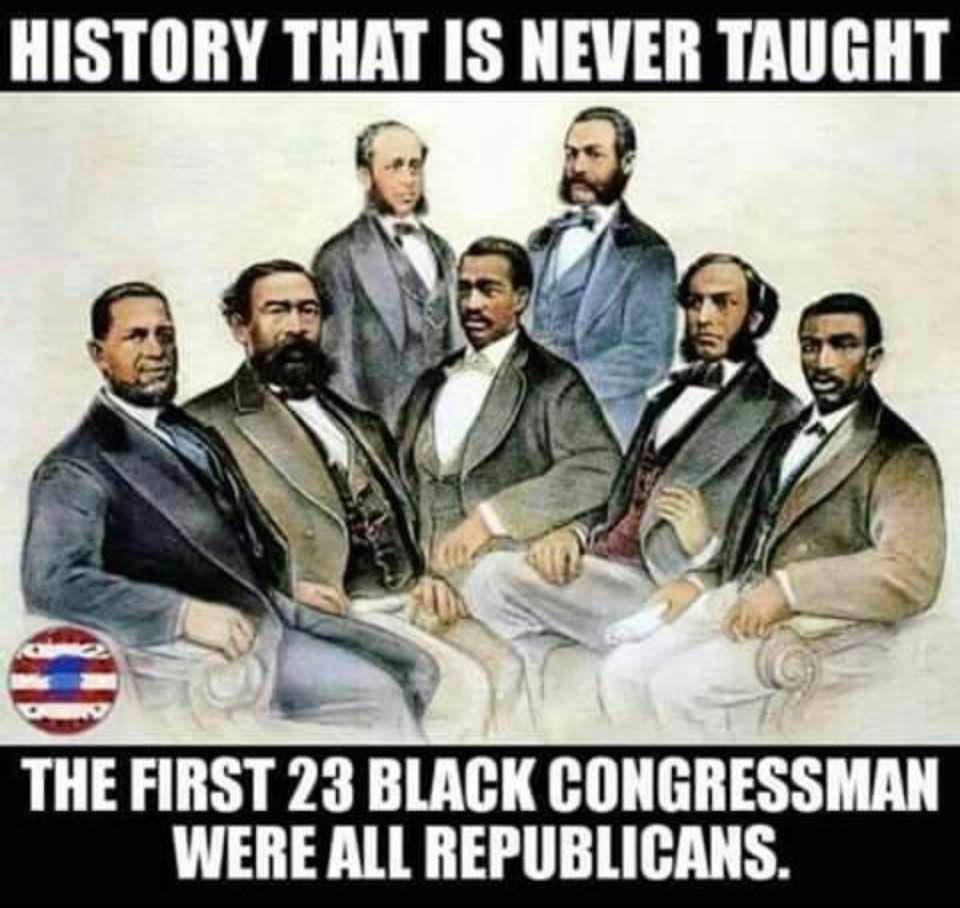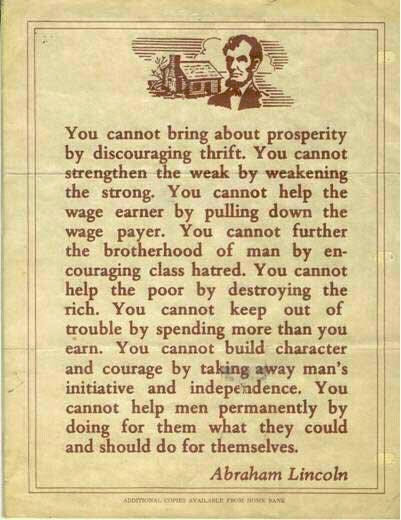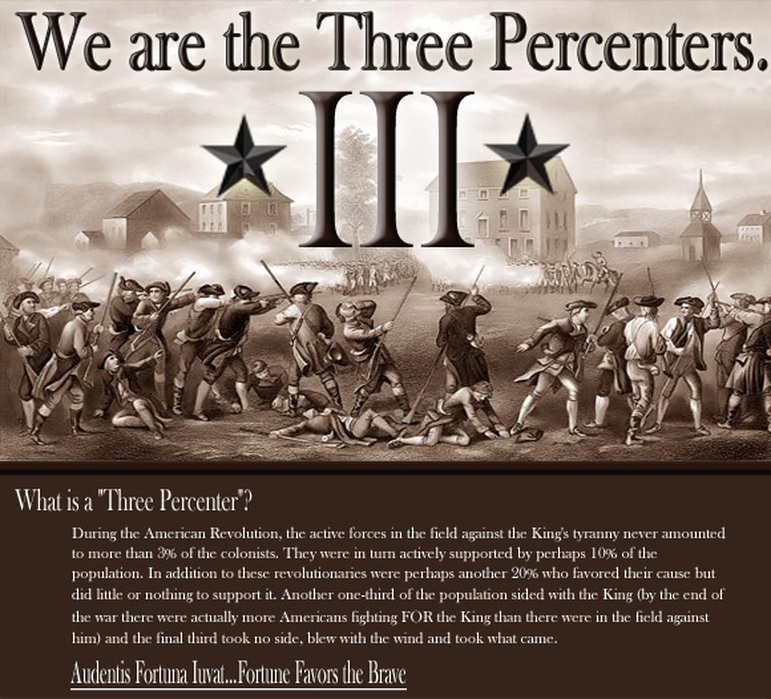|
This short history lesson happened in Argentina, and it’s now happening in the U.S. “Don’t Cry For Me, Argentina” or should say in “America”
To Those of Us Born 1925 - 1955:
~~~~~~~~~ TO ALL THE KIDS WHO SURVIVED THE 1930’s, 40’s, and 50’s !! First, we survived being born to mothers who may have smoked and/or drank - While they were pregnant. They took aspirin, ate blue cheese dressing, tuna from a can, and didn't get tested for diabetes. Then, after that trauma, we were put to sleep on our tummies in baby cribs Covered with bright colored Lead-based paints. We had no childproof lids on medicine bottles, locks on doors or cabinets, And, when we rode our bikes, We had baseball caps, Not helmets, on our heads. As infants and children, we would ride in cars with no car seats, no booster seats, no seat belts, no air bags, bald tires and sometimes no brakes.. Riding in the back of a pick- up truck on a warm day was always a special treat. We drank water from the garden hose and not from a bottle. We shared one soft drink with four friends, from one bottle, and no one actually died from this. We ate cupcakes, white bread, real butter, and bacon. We drank Kool-Aid made with real white sugar. And we weren't overweight. WHY? Because we were always outside playing...that's why! We would leave home in the morning and play all day, as long as we were back when the streetlights came on. No one was able to reach us all day .. . And, we were OKAY. We would spend hours building Our go-carts out of scrapsand then ride them down the hill, Only to find out that we forgot about brakes. After running into the bushes a few times, we learned To Solve the problem. We did not Have Play Stations, Nintendo and X-boxes. There were No video games, No 150 channels on cable, No video movies Or DVDs, No surround-sound or CDs, No cell phones, No personal computers, No Internet and No chat rooms. WE HAD FRIENDS And we went Outside and found them! We fell out of trees, got cut, Broke bones and Lost teeth, And there were No lawsuits From those accidents. We would get Spankings with wooden spoons, switches, ping-pong paddles, or just a bare hand, And no one would call child services to report abuse. We ate worms, And mud pies Made from dirt, And The worms did Not live in us forever. We were given BB guns for our 10th birthdays, 22 rifles for our 12th, rode horses, made up games with sticks and tennis balls, and -although we were Told it would happen- we did not put out very many eyes. We rode bikes Or walked to a friend's house and knocked on the door or rang the bell, or just Walked in and talked to them. Little League had tryouts And not everyone Made the team. Those who didn't Had to learn To deal with Disappointment. Imagine that!! The idea of a parent. Bailing us out If we broke the law was unheard of ... They actually sided with the law! These generations have Produced some of the best risk-takers, Problem solvers, and Inventors ever. The past 60 to 85 years. Have seen an explosion of innovation and new ideas. We had freedom, Failure, success and responsibility, and we learned How to deal with it all. If YOU are One of those born Between 1925-1955, CONGRATULATIONS! You might want to share this with others who have had the luck to grow up as kids before the lawyers and the government regulated so much of our lives for our own good. While you are at it, forward it to your kids, so they will know how brave and lucky their parents were. Kind of makes you want to run through the house with scissors, doesn't it ? ~~~~~~~ The quote of the month by Jay Leno: "With hurricanes, tornadoes, fires out of control, mud slides, flooding, severe thunderstorms tearing up the country from one end to another, and with the threat of bird flu and terrorist attacks, are we sure this is a good time to take God out of the Pledge of Allegiance?" 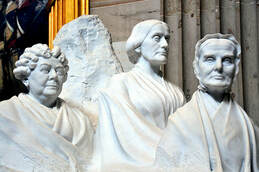
American Minute with Bill Federer
Womem's Suffrage Leaders: Susan B. Anthony, Lucretia Mott, Frances Willard, Emma Willard, Elizabeth Cady Stanton In the U.S. Capitol Rotunda is a sculpture of women suffrage leaders Susan B. Anthony, Elizabeth Cady Stanton, and Lucretia Mott. Lucretia Mott (1793-1880) was a noted Quaker minister praised by Frederick Douglass. She spoke at a Women's Rights Convention in Philadelphia, October 18, 1854. In the large audience were supporters abolitionist William Lloyd Garrison and her husband, Quaker leader James Mott, who was a founder of the Pennsylvania Anti-Slavery Society in 1838. Lucretia Mott stated: "On the occasion of the first miracle which it is said Christ wrought, a woman went before Him and said, 'Whatsoever he biddeth you do, that do.' The woman of Samaria said, 'Come and see the man who told me all the things that ever I did' ... ... The very first act of note that is mentioned when the disciples and apostles went forth after Jesus was removed from them, was the bringing up of an ancient prophecy to prove that they were right in the position they assumed on that occasion, when men and women were gathered together on the holy day of Pentecost, when every man heard and saw those wonderful works which are recorded. Then Peter stood forth ... quoting the prophet Joel ... that 'the time is come, this day is fulfilled the prophecy, when it is said, I will pour out my spirit upon all flesh, and your sons and your daughters shall prophesy,' etc. -- the language of the Bible is beautiful in its repetition -- 'upon my servants and my handmaidens I will pour out my spirit and they shall prophesy.' Now can anything be clearer than that?" Lucretia Mott, who is featured on a U.S. Postage Stamp,advocated for women suffrage, stating December 17, 1849: "The laws given on Mount Sinai for the government of man and woman were equal, the precepts of Jesus make no distinction. Those who read the Scriptures, and judge for themselves, not resting satisfied with the perverted application of the text, do not find the distinction, that theology and ecclesiastical authorities have made, in the condition of the sexes." America's God and Country Encyclopedia of Quotations Susan B. Anthony (1830-1906) is depicted on a U.S. dollar coin, and on a 3-cent stamp. She was raised a Quaker. Her father owned a cotton mill and refused to buy cotton from farmers who owned slaves. Susan B. Anthony's religious upbringing instilled in her the concept that every one is equal before God and motivated her to crusade for freedom for slaves. After the Civil War, Susan worked hard for the passage of the 13th, 14th and 15th Amendments. Opposing liquor, drunkenness and abortion, she encountered mobs, armed threats, objects thrown at her and was hung in effigy. Her efforts helped bring about the 18th Amendment (Prohibition),ratified in 1919. She succeeded in having women admitted to the University of Rochester, and campaigned for a woman's right to vote. Susan B. Anthony was arrested for voting in the 1872 Presidential Election, saying she "positively voted the Republican ticket-straight." In 1873, Susan stood trial before Justice Ward Hunt. in U.S. Federal Court. On the final day of the trial, she was allowed to speak, giving what was described as "the most famous speech in the history of the agitation for woman suffrage." Justice Ward kept interrupting her, ordering her to sit down, but she refused calling out "this high-handed outrage upon my citizen's rights." Justice Hunt fined her $100, which she immediately protested that she would never pay. Hunt announced she would not be jailed for failure to pay the fine, which effectively prevented the case from going to the Supreme Court. Susan B. Anthony died MARCH 13, 1906. Fourteen years after her death, women won the right to vote with the 19th Amendment, ratified in 1920. After learning her sister-in-law had had an abortion, Susan B. Anthony wrote in her diary: "She will rue the day she forces nature." Susan B. Anthony was quoted in The Revolution, July 1869: "I deplore the horrible crime of child-murder ... No matter what the motive, love of ease, or a desire to save from suffering the unborn innocent, the woman is awfully guilty who commits the deed. It will burden her conscience in life, it will burden her soul in death; But oh! Thrice guilty is he who ... drove her to the desperation which impels her to the crime." In a speech she gave repeatedly in the 1870s, Susan B. Anthony stated: "The prosecutions on our courts for breach of promise, divorce, adultery, bigamy, seduction, rape; the newspaper reports every day of every year of scandals and outrages, of wife murders and paramour shooting, of abortions and infanticides, are perpetual reminders of men's incapacity to cope successfully with this monster evil of society." American Minute-Notable Events of American Significance Remembered on the Date They Occurred Susan B. Anthony wrote in 1889 to Frances Willard: "Sweeter even than to have had the joy of caring for children of my own has it been to me to help bring about a better state of things for mothers generally, so that their unborn little ones could not be willed away from them." A statue of Francis Willard is in the U.S. Capitol Building's National Statuary Hall, placed there by the State of Illinois. She was the first woman college president in the United States,appointed to that position at Methodist Evanston College for Ladies in 1871. Frances Willard (1839-1898) whose family had changed from Congregational Christian to Methodist, directed women's meetings for Chicago evangelist Dwight L. Moody in 1877. In 1878, she was elected president of the Illinois chapter of the Women's Christian Temperance Union, then the next year became its national president. Frances Williard spoke in every state in the union at the time, campaigning for prohibition of liquor with the passage of the 18th Amendment, and promoting women voting with the 19th Amendment. Frances Willard defended "womanliness," explaining that a woman should first be womanly, and wrote in A White Life for Two (Chicago: Women's Temperance Publishing Association, 1890): "God sets male and female side by side throughout his realm of law." She was the first dean of women at Northwestern University, founder of the World's Woman's Christian Temperance Union, and first president of the National Council of Women. Frances Willard defended women being public speakers: "The masses of the people have forsaken God's house, and solace themselves in the saloons or the Sunday newspaper. But the masses will go to hear women when they speak. Every woman who leads a life of weekday holiness, has the Gospel in her looks, however plain her face and dress may be, has round her head the sweet Madonna's halo, in the eyes of every man who sees her. She speaks to him with the cadence of his own mother's voice. The devil knew what he was doing when he exhausted sophistry to keep woman down and silent ... Men have been preaching well nigh two thousand years, and the large majority of the converts have been women. Suppose now that women should share the preaching power, might it not be reasonably expected that a majority of the converts under their administration would be men? Indeed, how else are the latter to have a fair chance at the Gospel? ... Why, then should the pulpit be shorn of half its power?" Frances Willard's older cousin was Emma Willard (1787-1870), who was an American educator and historian. Emma was born in Berlin, Connecticut and began teaching at the age of sixteen. Emma was married to John Willard in 1809, and with his help she established a girl's boarding school in Middlebury, Vermont. Emma Willard founded Troy Female Seminary in 1821, which was the first school in the United States to offer higher education for women. Emma Willard explained that the 19th century version of feminism was as an exercise in "pure practical Christianity." A famous graduate from Troy Female Seminary in 1832 was Elizabeth Cady Stanton(1815-1902). Her " Declaration of Sentiments" at the 1848 Seneca Falls Convention is credited with initiating the nation's women's rights and women's suffrage movements. Regarding abortion, Elizabeth Cady Stanton wrote: "There must be a remedy for such a crying evil as this ... Let woman assert herself ... and end this wholesale suffering and murder of helpless children." Troy Female Seminary was renamed in 1895 to Emma Willard School. Emma wrote many successful books and later built a school for women in Athens, Greece. In 1843, Emma Willard wrote: "The government of the United States is acknowledged by the wise and good of other nations, to be the most free, impartial, and righteous government of the world; but all agree, that for such a government to be sustained for many years, the principles of truth and righteousness, taught in the Holy Scriptures, must be practiced. The rulers must govern in the fear of God, and the people obey the laws." In commenting on the United States, Emma Willard stated: "In observing the United States, there is much to convince us, that an Almighty, Overruling Providence, designed from the first, to place here a great, united people." In 1857, Emma Willardpublished a book for children titled, Morals for the Young: or, Good Principles Instilling Wisdom, in which she wrote: My Dear Children and Youth:- Since, then, wisdom teaches us to rate everything at its just value, it is wise to seek the favor and fear the frown of God, rather than to seek the favor,and fear the frown of men ... Look upon a Savior's cross ... ask pardon ... and the Holy Spirit's guidance ... receive the Christian's armor." American Minute-Notable Events of American Significance Remembered on the Date They Occurred American Minute is a registered trademark of William J. Federer. Permission is granted to forward, reprint, or duplicate, with acknowledgment. www.AmericanMinute.com Schedule Bill Federer for informative interviews & captivating PowerPoint presentations: 314-502-8924 wjfederer@gmail.com |
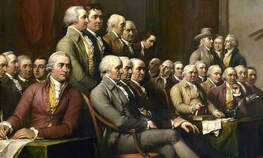
13 Patriotic Quotes from America’s Founding Fathers
By Jim Hayek July 4, 2019 It is increasingly popular to question America’s greatness and status as a “Shining City on a Hill,” but the Founding Fathers showed that patriotism is not a bad thing, and U.S. freedom should never be taken for granted. Honor the risk the nation’s earliest patriots took and celebrate Independence Day by remembering some of the most patriotic quotes from America’s Founding Fathers. Emphasis added:
__________________________ Proof that the NEW WORLD ORDER has been planned by the elite. Robert Welch, Founder of The John Birch Society, predicted today's problems with uncanny accuracy back in 1958 and prescribed solutions. Mind blowing speech by Robert Welch in 1958 predicting Insiders plans to destroy America. TPP talked about in 1958 You will hear Robert Weltch say that The Federal Government want's to control the States remember this is from 1958 . In 1958 Robert Weltch gave a Speech with Future.
___________________________ Socialism is a failed theory that has been seized with enthusiasm by the gullible, the deceived and the ignorant. The promised high ideals of socialist and communist societies have never materialized, no matter where or how often it’s tried. It’s been tried and failed in Yugoslavia, China, N. Korea, USSR, Cambodia, Cuba, Venezuela, Brazil, Sweden, Vietnam and numerous others. Socialism has caused more deaths and human misery than all other systems combined. But thanks to our mainstream media and public schools, the death toll of 120 million people from socialism* in the 20th century is ignored.
Socialism always ends the same way: oppression of the people, power and concentration of wealth by a tiny minority, and eventually economic collapse. But they say, THIS time it will be different. Remind me again, what’s the definition of insanity? Many millennials have bought into socialism, believing it’s more compassionate and better than the free enterprise system. They ignore history which shows that socialism leads to poverty, totalitarianism, the destruction of free speech and freedom of religion. It’s an evil doctrine of envy, and whenever it gets into power it destroys. No evidence that contradicts their doctrines can persuade them. They accept what they have been told, as a cult member accepts what their leader tells them. This depth of ignorance staggers the mind. This year the Communist Party USA (CPUSA) is celebrating its 100th anniversary. You haven’t heard anything about it because the CPUSA has morphed into the Democratic Party. To disguise their Communist beliefs they call themselves “Democratic socialists”. The last time the CPUSA ran a candidate for president was in 1984. Since then, the CPUSA has increasingly joined with the Democrats. Listen to the hundreds of millions of voices in the last century who have been murdered in the name of this false utopia. Socialism has never worked – not once, with anyone, in any nation, at any time in history. But I doubt that Democrats will seek the facts. For progressive socialists, feeeeelings prevail over logic, history, human nature, economics and facts every time. Start to learn the truth for yourselves. E.g. Hitler was a socialist. Look up Nazi on Wikipedia… * R. J. Rummel's book Death by Government (1994) __________________________ |
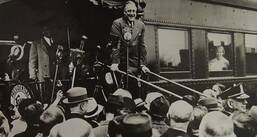
By Dr. Rafael Medoff
FDR pledged “the abrogation of all laws and decrees inspired by Nazi governments or Nazi ideologists.” But his public rhetoric apparently didn’t express his private feelings. Among the more remarkable documents of the Holocaust is a scroll, created in North Africa in 1943, called “Megillat Hitler.” Written in the style of Megillat Esther and the Purim story, it celebrates the Allies’ liberation of Morocco, Algeria, and Tunisia, which saved the local Jewish communities from the Nazis. What the scroll’s author did not realize, however, was that at the very moment he was setting quill to parchment, those same American authorities were actually trying to keep in place the anti-Jewish legislation imposed in North Africa by the Nazis. On November 8, 1942, American and British forces invaded Nazi-occupied Morocco, Algeria, and Tunisia. It took the Allies just eight days to defeat the Germans and their Vichy French partners in the region. For the 330,000 Jews of North Africa, the Allied conquest was heaven-sent. The Vichy regime that had ruled since the summer of 1940 had stripped the region’s Jews of their civil rights, severely restricted their entrance to schools and some professions, confiscated Jewish property, and tolerated sporadic pogroms against Jews by local Muslims. In addition, thousands of Jewish men were hauled away to forced-labor camps. President Franklin Roosevelt, in his victory announcement, pledged “the abrogation of all laws and decrees inspired by Nazi governments or Nazi ideologists.” But there turned out to be a discrepancy between FDR’s public rhetoric and his private feelings. On January 17, 1943, Roosevelt met in Casablanca with Major-General Charles Nogues, a leader of the new “non-Vichy” regime. When the conversation turned to the question of rights for North African Jewry, Roosevelt did not mince words: “The number of Jews engaged in the practice of the professions (law, medicine, etc) should be definitely limited to the percentage that the Jewish population in North Africa bears to the whole of the North African population… The President stated that his plan would further eliminate the specific and understandable complaints which the Germans bore toward the Jews in Germany, namely, that while they represented a small part of the population, over fifty percent of the lawyers, doctors, school teachers, college professors, etc., in Germany, were Jews.” (It is not clear how FDR came up with that wildly exaggerated statistic.) Purim-Style Salvation in Global Jewish CommunitiesVarious Jewish communities around the world have established local Purim-style celebrations to mark their deliverance from catastrophe. The Jews of Frankfurt, for example, would hold a “Purim Vintz” one week after Purim, in remembrance of the downfall of an antisemitic agitator in 1620. Libyan Jews traditionally organized a “Purim Ashraf” and a “Purim Bergel” to recall the rescue of Jews in those towns, in 1705 and 1795, respectively. In 1943, 400 rabbis marched to Washington to beg FDR to help rescue the Jews of Europe, but the president declined to meet with them. (wymaninstitute.org) The Jewish community of Casablanca, for its part, declared the day of the 1942 Allied liberation “Hitler Purim,” and a local scribe, P. Hassine, created the “Megillat Hitler.” (The original is on display at the United States Holocaust Memorial Museum.) The seven chapters of the scroll poignantly blend the flavor of the tale of ancient Persia with the amazing stroke of fortune that the Jews of Casablanca had themselves just experienced. It uses phrases straight from Megillat Esther, such as “the month which was turned from sorrow to rejoicing” and “the Jews had light and gladness, joy and honor,” side by side with modern references such as “Cursed be Hitler, cursed be Mussolini.” The Jews of North Africa had much to celebrate. But after the festivities died down, questions began to arise. The Allies permitted nearly all the original senior officials of the Vichy regime in North Africa to remain in the new government. The Vichy “Office of Jewish Affairs” continued to operate, as did the forced labor camps in which thousands of Jewish men were being held. American Jewish leaders were loathe to publicly take issue with the Roosevelt administration, but by the spring of 1943, they began speaking out. The American Jewish Congress and World Jewish Congress charged that “the anti-Jewish legacy of the Nazis remains intact in North Africa” and urged FDR to eliminate the Vichy laws. “The spirit of the Swastika hovers over the Stars and Stripes,” Benzion Netanyahu, director of the U.S. wing of the Revisionist Zionists (and father of Israel’s current prime minister) charged. A group of Jewish GIs in Algiers protested directly to U.S. ambassador Murphy. Editorials in a number of American newspapers echoed this criticism. At first, Roosevelt administration officials dug in their heels. Undersecretary of State Sumner Welles insisted that technically, the region was no longer under Allied military occupation and the U.S. could not dictate how the local government ran things. Megillat Hitler tells the story of the miraculous salvation of Morrocan Jews during the Holocaust. (http://image.invaluable.com/housePhotos/) “The under secretary of state was perhaps right from a strictly formal viewpoint,” Prof. Michael Abitbol noted in his study of North African Jewry during the Holocaust. “But he was strangely underestimating the immense influence wielded by the United States over North African internal politics.” Eventually, under the accumulated weight of public protests, the Roosevelt administration made it clear to the local authorities that the anti-Jewish measures needed to be repealed. The implementation process, however, was painfully slow. In April 1943, the forced labor camps in North Africa were officially shut down, although some of them continued operating well into the summer. The Jewish quotas in schools and professions were gradually phased out. In May, the racial laws in Tunisia were abolished. Two hundred Italian Jews who had been taken by the Allies to a Tunisian forced labor camp, because they were citizens of an Axis country, were released after several months. And on October 20, 1943, nearly a year after the Allied liberation, full rights for North Africa’s Jews were at last reinstated. The victory that “Megillat Hitler” celebrated was finally complete. (Dr. Medoff is director of The David S. Wyman Institutefor Holocaust Studies. This piece was written for Purim 2011.) __________________________ 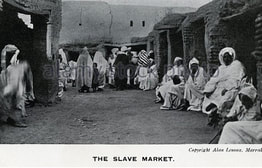
- Slavery - a long and shameful history.
by Bill Federer Slavery tragically existed for millenniums and across the globe. Ancient cultures made slaves of those captured in battle, as seen in Babylon, Persia, Greece, China, India, and Africa. Israelites were made to be slaves by powerful Pharaohs of Egypt for four hundred years. Julius Caesar conquered in Gaul and brought so many captured "slavic" peoples into to Rome that the term "slav" gained the connotation of permanent servant - "slave." Over half of Rome's population were slaves. Another form of slavery was generational indebtedness, spread by Roman Emperor Diocletian. In the 3rd and 4th century, the Roman economy became so bad that people who were unable to pay their mortgages would simply abandon their properties, renounce their Roman citizenship, and go off to live with the barbarians. To stop this, Diocletian made it a law that people could never run away from their debts -- thus tying them and their children to the land in perpetuity, creating the feudal system. This is essentially the case in India, with rural peasant farming families inheriting ancient indebtedness. The Royal Commission on Agriculture described that India's farmer "is born in debt, lives in debt and dies in debt." A more recent example of inescapable debt is that of young people in America locked into trillions of dollars of student loan debt that they can never escape:
Over a million Europeans were carried off into Islamic slavery. In 1189, Muslims raided Libson, Portugal, and enslaved 3,000 women and children. In 1191, Muslims attacked Silves, Portugal, and enslaved 3,000. When Saladin captured Jerusalem, according to Imad al-Din, approximately 7,000 men and 8,000 women were unable to pay a ransom so they were enslaved. Medieval Catholic religious orders of Trinitarians or Mathurins would collect donations to ransom people from Muslim slavery. Muslim raiders enslaved an estimated 180 million Africans over its 1,400 year expansion. Muslim slave markets existed in: North Africa: Tangier (Morocco), Marrakesh (Morocco). Algiers (Algeria). Tripoli (Libya), Cairo (Egypt), Aswan (Egypt); Khartoum, (Sudan); West Africa: Aoudaghost (Mauritania), Timbuktu (Mali), Gao (Mali), Bilma (Niger), Kano (Nigeria); Swahili Coast: Bagamoyo (Tanzania), Zanzibar (Tanzania), Kilwa (Tanzania), Sofala (Beira, Mozambique), Mombasa (Kenya); Horn of Africa: Assab (Eritrea), Massawa (Eritrea), Nefasit (Eritrea), Tadjoura (Djibouti), Zeila (Somalia), Mogadishu (Somalia), Kismayo (Somalia); Arabian Peninsula: Jeddah (Saudi Arabia), Zabīd (Yemen), Muscat (Oman), Aden (Yemen), Socotra (Indian Ocean); Indian Ocean: Debal (Sindh, Pakistan), Karachi (Sindh, Pakistan), Janjira (India), Surat (India), Mandvi, Kutch (India). There has never been a significant abolitionist movement in Islam as it could be interpreted as an indirect condemnation of Mohammed and the Rightly Guided Caliphs, as they owned slaves. Tragically, Muslim slave markets continue, with news reports giving shocking details of ISIS enslaving captured women, many of whom are Christian or Yazidi. The Clarion Project (3/3/16) reported: "ISIS Sells Yazidi Sex Slaves Far and Wide." Liberal academia defended this practice, as reported on February 7, 2017, where Georgetown University Professor Jonathan Brown, holder of the Al-Waleed bin Talal Chair in Islamic Civilization, delivered a lecture explaining how slavery and non-consensual sex (rape) are acceptable under Islamic sharia law. Organizations bringing relief to these victims include:
The Inca Empire had a system of mandatory public service known as mita, similar to the Aztec's tlacotin. When Spain conquered the New World in the early 1500's, conquistadors deposed Indian government leaders and ruled in their stead. In the Inca Empire, where native populations had been trained to obey government orders, they willingly obeyed their new Spanish leaders, even though it often meant dying in forced labor such as in the Potosi silver mines. Spaniards set up a system called encomienda or repartimiento, which was similar to feudal France's Corvée "unfree labour." Priests like Bartolomé de las Casas and the Franciscan Friars, together with Papal Bulls, fought to end the enslavement of native Americans. Unfortunately, those wanting to continue slavery sought to replace the freed natives with African slaves purchased from Muslim slave markets. In 1526, Lucas Vázquez de Ayllón explored the eastern coast of America as far north as Delaware Bay, then, somewhere near Sapelo Sound, Georgia. With 600, settlers, of which 100 were African slaves, he attempted a settlement named San Miguel de Gualdape. The Dominican friars who accompanying them celebrated the first recorded Catholic Mass in what would later be the United States. Unfortunately, that winter, two-thirds of the settlers died of disease, including Ayllón. The African slaves rebelled and ran off to live with the native tribe of Guales, becoming the first non-natives settlers in North America. Another early account was in 1528. Pánfilo de Narváez and Cabeza de Vaca led an expedition of 400 settlers to establish a settlement in Florida. Battered in a hurricane, they were shipwrecked near St. Petersburg. Natives misled, betrayed, and ambushed them. One member of the expedition, Juan Ortiz, was captured and enslaved by the Tocobaga tribe, being rescued 12 years later by De Soto's expedition. His story was related in the Discovery and Conquest of Terra Florida by a Gentleman of Elvas (1557), translated into English by Richard Hakluyt-the younger (1611: "This Christian's name was John Ortiz, and he was born in Seville ... He was twelve years in the hands of the Indians ... He came ... with ... Narváez ... to Florida ... A great number of Indians, which compassed them about, and took them in a place where they could not flee; and the others ... they presently killed ... They took John Ortiz alive, and carried him to Ucita their lord ... Ucita commanded to bind John Ortiz hand and foot upon four stakes aloft upon a raft, and to make a fire under him, that there he might be burned. But a daughter of his desired him that he would not put him to death, alleging ... that it was more for his honor to keep him as a captive ... John Ortiz ... notice ... the damsel that had delivered him from the fire, how her father was determined to sacrifice him ... She went with him half a league out of the town by night, and set him in the way, and returned, because she would not be discovered. John Ortiz travailed all the night, and by the morning came unto a river." The surviving 80 members of the Narváez expedition returned to the Tampa Bay coast. They salvaged their wrecked vessel and fashioned it into two rafts, using deer skins for bellows to blow air into the fire, making it hot enough to forge metal nails. They floated along the coast of the Gulf of Mexico from Florida to the mouth of the Mississippi River, where they were suddenly swept out hundreds of miles. Narváez was never found, and Cabeza de Vaca, with two dozen others, were shipwrecked near present day Galveston, where they were enslaved by natives. Four found an opportunity to escape:
Cabeza de Vaca preached the Gospel and prayed Christian prayers for sick natives to be healed, with reports of miraculous recoveries. Gaining a reputation as a "faith healer," the Indians let him travel freely. Cabeza de Vaca and his companions came down the coast of the Gulf of California to Sinaloa, then finally to Mexico City in 1536, eight years after the expedition began. Cabeza de Vaca sailed back to Spain. He later returned to the New World in 1540, as governor of New Andalusia (Argentina), where he helped settle Buenas Aires. The first African slaves brought to the English colony of Virginia came on a Dutch ship in 1619. Over the next two centuries, the number of slaves tragically grew from "20 and odd" to an estimated 4 million by 1860. A lesser known chapters of slaves brought to America occurred in the 1600s when King James I, followed by Charles I and Oliver Cromwell, sold over 500,000 Irish Catholics into slavery onto plantations in the West Indies, Antigua, Montserrat, Jamaica, Barbados, as well as Virginia and New England. Additionally, many poor Europeans sold themselves as "indentured servants" -- a temporary slavery -- for seven years, in exchange for transportation to America. From 1714-1756, thousands of oppressed Irish sold themselves as indentured slaves in return for passage, usually to Pennsylvania, hoping to take advantage of William Penn's promise of toleration. Historian Will Durant wrote in The Story of Civilization: "The Irish scene was one of the most shameful in history." Indian tribes would sell captives from other tribes into slavery. Sacagawea, a Lemhi Shoshone, was captured by the Hidatsa people and sold to the Frenchman Toussaint Charbonneau, who accompanied Lewis and Clark on their explorations. York, an African slave of William Clark, was part of Lewis and Clark's Corps of Discovery. Some Native Americans owned African slaves. In 1842, there was an African slave revolt in Cherokee Territory. After colonial conflicts with American Indians, some were sold into slavery in the West Indies. Christian missionaries and movements, especially Quakers, Moravians, and Methodists, were a continual voice of conscience against slavery. Jefferson pushed through legislation ending the importation of slaves into the United States, telling Congress, December 2, 1806: "... to withdraw the citizens of the United States from all further participation in those violations of human rights which have been so long continued on the unoffending inhabitants of Africa, and which the morality, the reputation, and the best interests of our country, have long been eager to proscribe." Haiti had several slave revolts against the French government. Fear that Haitian slave revolts would spread was a compelling factor convincing Napoleon to sell the French Louisiana Territory to the United States. Tragically, some slavery continues, with Reuters publishing an article, February 7, 2017: "Haiti hotel police exposes child sex trafficking." In 1820, a U.S. revenue cutter captured the slave ship Antelope off the coast of Florida with nearly 300 African slaves. Francis Scott Key fought to free the slaves, spending seven years in an expensive legal battle which went all the way to the Supreme Court in 1825. When Democrats wanted to expand slavery into this new Louisiana Territory, it resulted in "Bleeding Kansas." Prior to the Civil War, America was divided into 5 categories:
Slavery began in Cuba earlier and lasted longer than most anywhere in the Americas. A notorious trade triangle developed with Havana, Cuba, at its center: SLAVES from Africa to SUGAR from the Caribbean to RUM in England. An international incident occurred in 1839 when a Portuguese ship from Sierra Leone transferred 53 slaves to the Cuban ship Amistad. On July 1, 1839, the African slaves broke free of their shackles and seized control of the ship, demanding to be sailed back to Africa. The captain misdirected the ship, sailing slowly east during the day, but quickly west at night, finally landing at Long Island, New York, where the slaves were arrested. The Amistad case went to the Supreme Court. 74-year-old former President John Quincy Adams, known as "Old Man Eloquent," defended the jailed Africans, writing; "By the blessing of God, I will argue the case before the Supreme Court." This was portrayed in Steven Spielberg's 1997 film Amistad, starring Morgan Freeman, Nigel Hawthorne, Anthony Hopkins, Djimon Hounsou, and Matthew McConaughey. John Quincy Adams wrote in his journal, October 1840: "I implore the mercy of God to control my temper, to enlighten my soul, and to give me utterance, that I may prove myself in every respect equal to the task." Francis Scott Key gave Adams legal advice to free the slaves. Adams shook hands with Africans Cinque and Grabeau, saying: "God willing, we will make you free." Against all odds, John Quincy Adams won freedom for these Africans. President James Buchanan wrote December 19, 1859: "When a market for African slaves shall no longer be furnished in Cuba ... Christianity and civilization may gradually penetrate the existing gloom." In 1868, a revolt began in Cuba by a farmer of Spanish descent crying out for racial equality, freedom of speech and freedom of association. Spain put down the Cuban revolt in the Ten Years War, killing thousands. A Spanish Royal decree finally ended slavery in Cuba in 1886. In 1895, another rebellion began in Cuba and Spain sent 200,000 soldiers to put it down. Thousands were put into concentration camps where they suffered from starvation, disease and exposure. Yellow Press journalism excited the American public, who demanded President William McKinley intervene. The U.S.S. Maine was sent to Havana, and on FEBRUARY 15, 1898, it blew up in the harbor under suspicious conditions, beginning the Spanish-American War. President McKinley approved the Resolution of Congress: "Whereas the abhorrent conditions which have existed for more than three years in the island of Cuba, so near our own borders, have shocked the moral sense of the people of the United States, have been a disgrace to Christian civilization, culminating, as they have, in the destruction of a United States battle ship, with 266 of its officers and crew, while on a friendly visit in the harbor of Havana, and cannot longer be endured ... Resolved by the Senate and House of Representatives ... that the people of the island of Cuba are and of right ought to be free." There are more slaves today than at any time in human history, reported Benjamin Skinner, a fellow at the Carr Center for Human Rights Policy at Harvard Kennedy School of Government. An estimated 27 million people in the world are forced to work, held through fraud, under threat of violence, for no pay beyond subsistence, in forced marriages, in sex-trafficking and prostitution. Though mostly illegal, slavery, by its different names, exists today in India, Pakistan, Nepal, Bhutan, Southeast Asia, Romania, Sudan, Haiti, Brazil, Latin America, and even in the United States. Those most loudly demanding reparations for past slavery are strangely silent regarding present-day slavery. TIME Magazine reported January 18, 2010: "Despite more than a dozen international conventions banning slavery in the past 150 years, there are more slaves today than at any point in human history." In arguing before the Supreme Court to free slaves of the Amistad ship, John Quincy Adams stated: "The moment you come to the Declaration of Independence, that every man has a right to life and liberty, an inalienable right, this case is decided. I ask nothing more in behalf of these unfortunate men than this Declaration." ___________________________ An Absolute "Must-Read! |
|
|
JFK's Fate Explains the Coming Conflict of Today
|
History with its flickering lamp stumbles along the trail of the past, trying to reconstruct its scenes, to revive its echoes, and kindle with pale gleams the passion of former days. ~Winston Churchill
Every major horror of history was committed in the name of an altruistic motive. Has any act of selfishness ever equaled the carnage perpetrated by disciples of altruism? ~Ayn Rand, The Fountainhead
_______________________________________________________________________________
Every major horror of history was committed in the name of an altruistic motive. Has any act of selfishness ever equaled the carnage perpetrated by disciples of altruism? ~Ayn Rand, The Fountainhead
_______________________________________________________________________________
